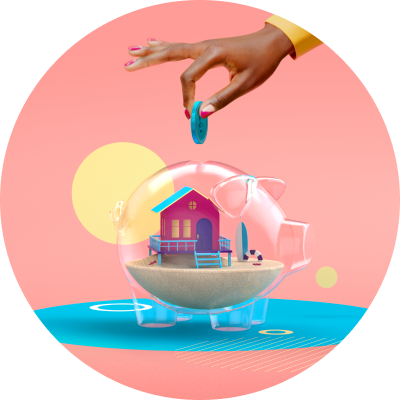Personal Loan Guide for Beginners
Personal Loans:
Guide to Personal Loans for Beginners
Whether you’re looking to consolidate debt, cover an emergency expense, or foot the bill for a large purchase or project, you may be considering taking out a personal loan.
While personal loans do offer a great deal of flexibility, they also work a little differently than other types of loans. To help you get up to speed, we created this step-by-step personal loan guide for beginners. Here’s what you need to know before you apply.

What Is a Personal Loan?
Personal loans are a type of installment loan issued by banks, credit unions, or online lenders. Borrowers receive a lump sum of money that they then pay back in regular, fixed payments over a set term.
Unlike a mortgage or auto loan, personal loans are flexible. This means you can use the money for just about anything you want.
As you begin to research your options, you’ll discover there are different types of personal loans. The type you choose may depend on the amount you plan on borrowing, your credit and financial history, the amount of debt you currently have, and other factors.
What Are Personal Loans Used For?
Although personal loans let you put the money toward just about anything, there are ways borrowers commonly use the funds. Examples include paying for big expenses like a wedding or home remodel, consolidating debt, and family planning.
That said, personal loans often come with some general restrictions. For instance, lenders typically won’t allow loan funds to be used for a down payment on a home, to pay college tuition and fees, to cover business expenses, or to invest. In those cases, you may choose to tap into your savings or explore alternatives to personal loans.
What Are Interest Rates and How Do They Work?
As you review personal loan options, interest rate is a figure you’ll likely keep a close eye on. The higher the interest rate, the more money you could end up paying in interest payments over the life of the loan.
To determine the interest rate on a personal loan, a lender will consider a number of different factors, including the amount being borrowed, the borrower’s credit history and income, and the length of the loan.
This choice affects:
• Whether your interest rate can change
• Whether your monthly principal and interest payment can change and its amount
• How much interest you will pay over the life of the loan
You’ll also want to note whether the loan is a fixed rate or variable rate. Each type works differently and could impact your monthly payment and overall costs.
💡 Quick Tip: A low-interest personal loan from SoFi can help you consolidate your debts, lower your monthly payments, and get you out of debt sooner.
How Much of a Personal Loan Can I Get?
Loan amounts vary by lender but can start as low as $600 and go as high as $50,000. Some lenders, including SoFi, offer personal loans up to $100,000.
The loan amount, terms, and rates you qualify for will depend on your budget and other factors unique to you, including:
• Credit score. The minimum required credit score for a personal loan can start at 580. But to get the best terms and rates, you usually need a credit score of at least 640.
• Debt-to-income ratio (DTI) ratio. Lenders usually like to see a DTI no higher than 35% to 40%, but if you have a high credit score, you could get approved with a slightly higher DTI.
• Income and employment history
• Loan purpose
• Lender amount limits
• Whether you’re offering collateral. Applying for a secured loan, which requires providing a valuable asset as backup, could help you get a bump in your personal loan amount.
Just as important is having a clear understanding of your financial situation so you can decide how much you’re able to borrow — and how much you can afford to pay off on a regular basis.
What Are the Typical Personal Loan Requirements Needed for Approval?
Lenders don’t consult a universal list of qualifications when they’re considering a loan application. But there are certain metrics they tend to look at more closely, including a borrower’s credit score, debt-to-income ratio, and proof of income and employment.
Some lenders may also require collateral for personal loans. One upside to using your home, car, or other valuable asset to back up a loan is that it could help you qualify for a lower interest rate. But if you default, the lender could seize the property.
As you’re preparing to apply for a personal loan, there are steps you can take to get your financial house in order, such as maintaining a stable, steady income and monitoring your credit score.
How Do I Apply for a Personal Loan?
Once you’ve researched your funding options and figured out how much money you can borrow, you may be ready for the next step: applying for a personal loan.
The process can be relatively simple and straightforward, provided you’ve done your homework, meet the lender’s requirements, and gathered all the necessary papers ahead of time. Depending on your lender, you may get approved within one to three business days and receive the funds within a week or less.
What happens if your application is rejected? All is not lost. You can find out why your loan was denied and get to work addressing the issue.
💡 Quick Tip: Just as there are no free lunches, there are no guaranteed loans. So beware lenders who advertise them. If they are legitimate, they need to know your creditworthiness before offering you a loan.
Can I Pay Off a Personal Loan Early?
It typically takes borrowers anywhere from two to five years to pay off a personal loan, though some borrowers may take longer. However, there may be times when you want to pay off a loan even faster. Is that possible? Short answer: Yes, and in many cases it’s a good idea to do so. However, you may be hit with a prepayment penalty, which could negate any savings you might see on interest costs.
Before you decide whether to pay off the balance, consider asking your lender whether they’ll waive the penalty. You may also want to calculate whether it makes sense to pay off the loan early, even with the penalty, and what impact (if any) the move will have on your credit.
What Are Some Alternatives to Personal Loans?
If you need to fund a major project or cover a large expense and don’t want to use a personal loan, there are plenty of alternatives to fit a variety of situations.
Before you decide whether to pay off the balance, consider asking your lender whether they’ll waive the penalty. You may also want to calculate whether it makes sense to pay off the loan early, even with the penalty, and what impact (if any) the move will have on your credit.
A home equity line of credit (HELOC), for instance, is designed so you can tap into funds as you need them and only pay interest on what you borrow. A credit card, on the other hand, is usually seen as a good option for smaller, everyday purchases.
By understanding the personal loan alternatives available to you — and weighing the advantages and disadvantages of each — you can figure out what option best fits your needs and financial goals.
The Takeaway
With their flexibility, personal loans can be a smart choice if you’re looking to finance a major project like a home remodel or consolidate high-interest debt. As you’re exploring different types of loans, it helps to understand how much you’re able to borrow and how much you can afford to pay off each month. It’s also a good idea to maintain a strong, stable income, keep your debt-to-income-ratio low, and monitor your credit and resolve any issues as they arise. And if a personal loan isn’t right for your situation, rest assured there are personal loan alternatives that may be a better fit.
Apply for your personal loan
Think twice before turning to high-interest credit cards. Consider a SoFi personal loan instead. SoFi offers competitive fixed rates and same-day funding. See your rate in minutes.
FAQ
Which type of personal loan is easiest to get?
No-credit check loans are one of the easiest types of loans to get. While these loans provide borrowers with quick cash, they also tend to come with very high interest rates and short repayment periods.
Do most personal loans get approved?
There’s no guarantee your loan will be approved, but it helps if you have good credit, maintain a steady, stable income, and have a debt-to-income ratio no higher than 35% to 40%.
Are there risks associated with personal loans?
There are potential drawbacks associated with personal loans. For example, borrowers are often charged interest and fees, such as a one-time origination fee. Those with a less-than-great credit score may also have a high annual percentage rate. Depending on your financial situation, the extra debt could be difficult for you to manage. And if you fail to make payments, your credit score could take a hit and you could face legal action.
Do personal loans affect credit scores?
Short answer: Yes. If you make regular, on-time loan payments, you’ll help build up your credit. If your payments are late, or you stop making payments altogether, your credit score will likely take a hit and the late payments will be reported to credit bureaus.
What should you know about personal loan interest rates?
Personal loan interest rates can vary by lender, a borrower’s credit worthiness, and other factors. A strong credit score, stable income, and low debt-to-income ratio could help increase your chances of getting a better deal.
SoFi Loan Products
SoFi loans are originated by SoFi Bank, N.A., NMLS #696891 (Member FDIC). For additional product-specific legal and licensing information, see SoFi.com/legal. Equal Housing Lender.
Disclaimer: Many factors affect your credit scores and the interest rates you may receive. SoFi is not a Credit Repair Organization as defined under federal or state law, including the Credit Repair Organizations Act. SoFi does not provide “credit repair” services or advice or assistance regarding “rebuilding” or “improving” your credit record, credit history, or credit rating. For details, see the FTC’s website .
Financial Tips & Strategies: The tips provided on this website are of a general nature and do not take into account your specific objectives, financial situation, and needs. You should always consider their appropriateness given your own circumstances.
SOPL0723009

















